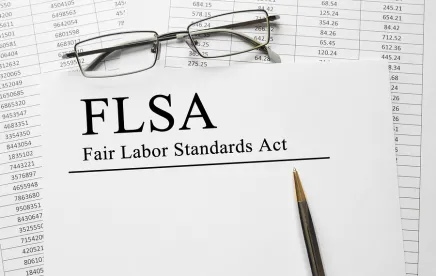As 2018 came to a close, a pair of federal court decisions provide much needed guidance on two thorny wage and hour issues that are being increasingly litigated nationwide under the Fair Labor Standards Act (FLSA). In one decision, the court held that an employee who was paid all owed wages shortly after filing a lawsuit was not a “prevailing party” for fee-shifting purposes. In another decision, a federal appeals court confirmed that FLSA minimum wage violations are measured based on the workweek.
In Fast v. Cash Depot LTD., a Wisconsin federal court judge held that the plaintiff/employee’s attorney was not entitled to recover a cent of the requested attorney’s fees and costs in an FLSA action. In Cash, a non-exempt Field Service Technician filed a lawsuit alleging that his employer did not pay him (as well as a putative class) the correct overtime rate in violation of the FLSA. Shortly thereafter, the employer hired an accounting firm to review the company’s payroll practices. The accounting firm uncovered an underpayment (including interest) totaling more than $20,000.00 as to the employee that filed the suit, as well as 63 other current and former employees. The employer tendered checks to the 63 individuals, as well as a check for $338.98 to the employee that filed the suit. The $338.98 represented owed overtime compensation plus FLSA liquidated damages. The employer also mailed the employee’s attorney a check for $13,333.35 – the exact amount of attorney’s fees and costs claimed in discovery responses. Even though the employee later conceded that the amounts tendered accounted for all wages owed under the FLSA, neither the employee nor the employee’s attorney cashed the checks.
Once the employer tendered all the checks, the parties agreed that the only remaining issue was reimbursement of attorney’s fees and costs. The employee requested in excess of $50,000.00 for attorney’s fees and costs, and the employer in turn sought to dismiss the case, arguing that no attorney’s fees are owed because the employee was not a “prevailing party.” The court agreed with the employer. Under the FLSA, an employee deemed to be a “prevailing party” in court recovers his/her attorney’s fees from the employer. The court, however, held that based on U.S. Supreme Court case law, a prevailing party for FLSA purposes is one that obtains a “judicially sanctioned change in the legal relationship of the parties,” such as when judgment is entered for the employee or when the court approves a settlement agreement. No such change took place in this case as the employer voluntarily paid the employee and the putative class members all wages owed under the FLSA. Because the employee did not qualify as a prevailing party, the court dismissed the case without awarding any attorney’s fees or costs to the employee.
Employers garnered another victory in Hirst v. SkyWest, Inc. Flight attendants brought FLSA minimum wage claims arguing that they were not paid any amount for certain work performed during the day, such as the time between clearing security at the airport and when the main cabin door closes for takeoff. The flight attendants filed cases in California and Illinois but in both cases, none of the flight attendants alleged a single workweek in which the airlines paid them, on average, less than the federal minimum wage ($7.25 per hour) for all hours worked. The employees argued that FLSA minimum wage compliance should not be measured based on the workweek; instead, compliance should be measured based on industry standards and at least as to flight attendants, that means the length of “pairing” – the time out and back from their base airport. While noting that the FLSA itself does not require workweek compliance, the three-judge panel sitting in the U.S. Court of Appeals for the Seventh Circuit deferred to longstanding U.S. Department of Labor guidance, as well as the “[o]ther circuits [that] have uniformly adopted the Department’s per-workweek measure,” and held that FLSA minimum wage compliance is measured based on the workweek. The court upheld the dismissal of the FLSA claim because the flight attendants could not allege at least one workweek in which they did not receive, on average, the minimum wage for all hours worked (the court did not uphold dismissal of the state law claims, but for reasons separate and apart from the FLSA analysis).
Practical Considerations for Employers
In FLSA litigation, employers often face difficult decisions in trying to minimize legal exposure. A significant component of exposure under the FLSA is the payment of an attorney’s fees award if the employee succeeds in court. While the Fast opinion is not binding nationwide, the Wisconsin judge did cite U.S. Supreme Court law in holding that an attorney’s fees recovery is cut off upon the payment of all owed wages, interest, liquidated damages, and attorney’s fees. Should employers wish to explore this litigation strategy, it is important to ensure that they tender payment representing the absolute full extent of possible recovery under the FLSA.
In addition, the recent Seventh Circuit opinion reinforces the proposition that employers must ensure, on a weekly basis – at the very least – that they are paying their employees an average hourly rate that matches or exceeds the minimum wage.
Of course, in addition to the FLSA, employers must also contend with state wage & hour laws – for which issues such as damage multipliers, the measure of damages, and fee-shifting provisions vary by statute.



 />i
/>i
